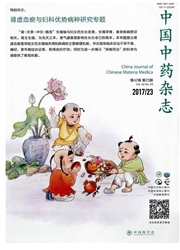

 中文摘要:
中文摘要:
基于土家治毒药理论,分析土家治毒药的组方用药规律,为进一步挖掘土家医药方剂用药规律提供参考。通过对药物名称标准化后,建立土家医方剂和治毒药数据库,对治毒药性一味关系、土家医方剂中治毒药使用频次、常用治毒药与非治毒药组合等进行统计分析,得到20个出现频次最高的药物组合。研究表明,土家治毒药药性多属寒、凉,药味以苦、甘、辛居多;治毒药在土家医方剂中的使用频次较低;治毒药在方剂中多作为主药、帮药使用,其在土家医用药体系中发挥着重要作用;相对使用频次高的治毒药物有大血藤、血当归、土茯苓、五爪龙、水菖蒲和蛇莓等,与之相配的药物有小血藤、三百棒、月季花、甘草和车前草等。本研究旨在探索治毒药在复方中的使用规律,验证了治毒药在土家方剂中的重要地位,为完善土家方剂挖掘整理、组方配伍规律分析奠定了基础。
 英文摘要:
英文摘要:
Based on the theory of Tujia medicine, this study analysed prescription regularity of Tujia detoxication herbs and provided reference for the use of Tujia prescription. Through the analysis of the Tujia prescription and detoxication herbs, we determined the fre- quency of the use of detoxication herb in the prescription and the commonly used herbs combination, and obtained 20 herbs combination a- bout detoxication herbs. The research shows that the detoxication herbs are partial to cold, taste bitter camsing, and often have a synergis- tic effect with other herbs. This study explored the prescription and medication regularity of Tujia detoxication herbs, and verified the de- toxication herbs in the role of Tujia prescriptions and laid the foundation for the research of Tujia prescriptions.
 同期刊论文项目
同期刊论文项目
 同项目期刊论文
同项目期刊论文
 期刊信息
期刊信息
